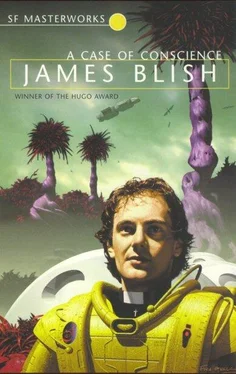“I wish you a good journey,” the Lithian said, “wherever you may go. I wish also that your road may lead back to this world at some future time. I have brought you the gift that I sought before to give you, if the moment is now appropriate.”
Cleaver had straightened and was now glaring up suspiciously at the Lithian. Since he did not understand the language, he was unable to find anything to which he could object. He simply stood there and radiated unwelcomeness.
“Thank you,” Ruiz-Sanchez said. This creature of Satan made him miserable all over again, made him feel intolerably in the wrong. Yet how could Chtexa know—?
The Lithian was holding out to him a small vase, sealed at the top and provided with two gently looping handles. The gleaming porcelain of which it had been made still carried inside it, under the glaze, the fire which had formed it; it was iridescent, alive with long quivering festoons and plumes of rainbows, and the form as a whole would have made any potter of Greece abandon his trade in shame. It was so beautiful that one could imagine no use for it at all. Certainly one could not make a lamp of it, or fill it with leftover beets and put it in the refrigerator. Besides, it would take up too much space.
“This is the gift,” Chtexa said. “It is the finest container yet to come out of Xoredeshch Gton. The material of which it is made includes traces of every element to be found on Lithia, even including iron, and thus, as you see, it shows the colors of every shade of emotion and of thought. On Earth, it will tell Earthmen much of Lithia.”
“We will be unable to analyze it,” Ruiz-Sanchez said. “It is too perfect to destroy, too perfect even to open.”
“Ah, but we wish you to open it,” Chtexa said. “For it contains our other gift.”
“Another gift?”
“Yes, and a more important one. It is a fertilized, living egg of our species. Take it with you. By the time you reach Earth, it will have hatched, and will be ready to grow up with you in your strange and marvelous world. The container is the gift of all of us; but the child inside is my gift, for it is my child.”
Appalled, Ruiz-Sanchez took the vase in trembling hands, as though he expected it to explode—as indeed he did. It shook with subdued flame in his grip.
“Good-bye,” Chtexa said. He turned and walked away, back toward the entrance to the path. Cleaver watched him go, shading his eyes.
“Now what was that all about?” the physicist said. “The Snake couldn’t have made a bigger thing of it if he’d been handing you his own head on a platter. And all the time it was only a jug!”
Ruiz-Sanchez did not answer. He could not have spoken even to himself. He turned away and began to ascend the cleats, cradling the vase carefully in one elbow. It was not the gift he had hoped to bring to the holy city for the grand indulgence of all mankind, no; but it was all he had.
While he was still climbing, a shadow passed rapidly over the hull: Cleaver’s last crate, being borne aloft into the hold by a crane.
Then he was in the air lock, with the rising whine of the ship’s Nernst generators around him. A long shaft of sunlight was cast ahead of him, picking out his shadow on the deck. After a moment, a second shadow overlaid and blurred his own: Cleaver’s. Then the light dimmed and went out. The air lock door slammed.
At first Egtverchi knew nothing, in the peculiarly regular and chilly womb where he floated, except his name. That was inherited, and marked in a twist of desoxyribonucleic acid upon one of his genes; farther up on the same chromosome, the x-chromosome, another gene carried his father’s name: Chtexa. And that was all. At the moment he had begun his independent life, as a zygote or fertilized egg, that had been written down in letters of chromatin: his name was Egtverchi, his race Lithian, his sex male, his inheritance continuous back through Lithian centuries to the moment when the world of Lithia began. He did not need to understand this; it was implicit.
But it was dark, chilly, and too regular in the pouch. Tiny as a speck of pollen, Egtverchi drifted in the fluid which sustained him, from wall to smoothly curved and unnaturally glazed wall, not conscious yet, but constantly, chemically reminded that he was not in his mother’s pouch. No gene that he carried bore his mother’s name, but he knew—not in his brain, for he had none yet, but by feel, with purely chemical revulsion—whose child he was, of what race he was, and where he should be: not here. And so he grew—and drifted, seeking to attach himself at every circuit to the chilly glass-lined pouch which rejected him always. By the time of gastrulation, the attachment reflex had run its course and he forgot it. Now he merely floated, knowing once more only what he had known at the beginning: his race Lithian, his sex male, his name Egtverchi, his father Chtexa, his life due to begin; and his birth world as bitter and black as the inside of a jug.
Then his notochord formed, and his nerve cells congregated in a tiny knot at one end of it. Now he had a front end and a hind end, as well as an address. He also had a brain—and now he was a fish—a spawn, not even a fingerling yet, circling and circling in the cold enclave of sea. That sea was tideless and lightless, but there was some motion in it, the slow roll of convection currents. Sometimes, too, something went through it which was not a current, forcing him far down toward the bottom, or against the walls. He did not know the name of this force—as a fish he knew nothing, only circled with the endlessness of his hunger—but he fought it, as he would have fought cold or heat. There was a sense in his head, aft of his gills, which told him which way was up. It told him, too, that a fish in its natural medium has mass and inertia, but no weight. The sporadic waves of gravity—or acceleration—which whelmed through the lightless water were no part of his instinctual world, and when they were over he was often swimming desperately on his back.
There came a time when there was no more food in the little sea; but time and the calculations of his father were kind to him. Precisely at that time the weight force returned more powerfully than had even been suggested as possible before, and he was driven to sluggish immobility for a long period, fanning the water at the bottom of the jug past his gills with slow exhausted motions.
It was over at last, and then the little sea was moving jerkily from side to side, up and down, and forward. Egtverchi was now about the size of a larval fresh-water eel. Beneath his pectoral bones twin sacs were forming, which connected with no other system of his body, but were becoming more and more richly supplied with capillaries. There was nothing inside the sacs but a little gaseous nitrogen, just enough to equalize the pressure. In due course, they would be rudimentary lungs.
Then there was light.
To begin with, the top of the world was taken off. Egtverchi’s eyes would not have focussed at this stage in any case and, like any evolved creature, he was subject to the neo-Lamarckian laws which provide that even a completely inherited ability will develop badly if it is formed in the absence of any opportunity to function. As a Lithian, with a Lithian’s special sensitivity to the modifying pressures of environment, the long darkness had done him less potential damage than it surely would have done another creature—say, an Earth creature; nevertheless, he would pay for it in due course. Now, he could sense no more than that in the up direction (now quite stable and unchanging) there was light. He rose toward it, his pectoral fins strumming the warm harps of the water.
Father Ramon Ruiz-Sanchez, late of Peru, late of Lithia, and always Fellow in the Society of Jesus, watched the surfacing, darting little creature with surfacing strange emotions. He could not help feeling for the sinuous eel the pity that he felt for every living thing, and an aesthetic delight in the flashing unpredictable certainty of its motions. But this little animal was Lithian.
Читать дальше











